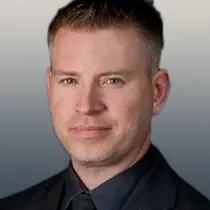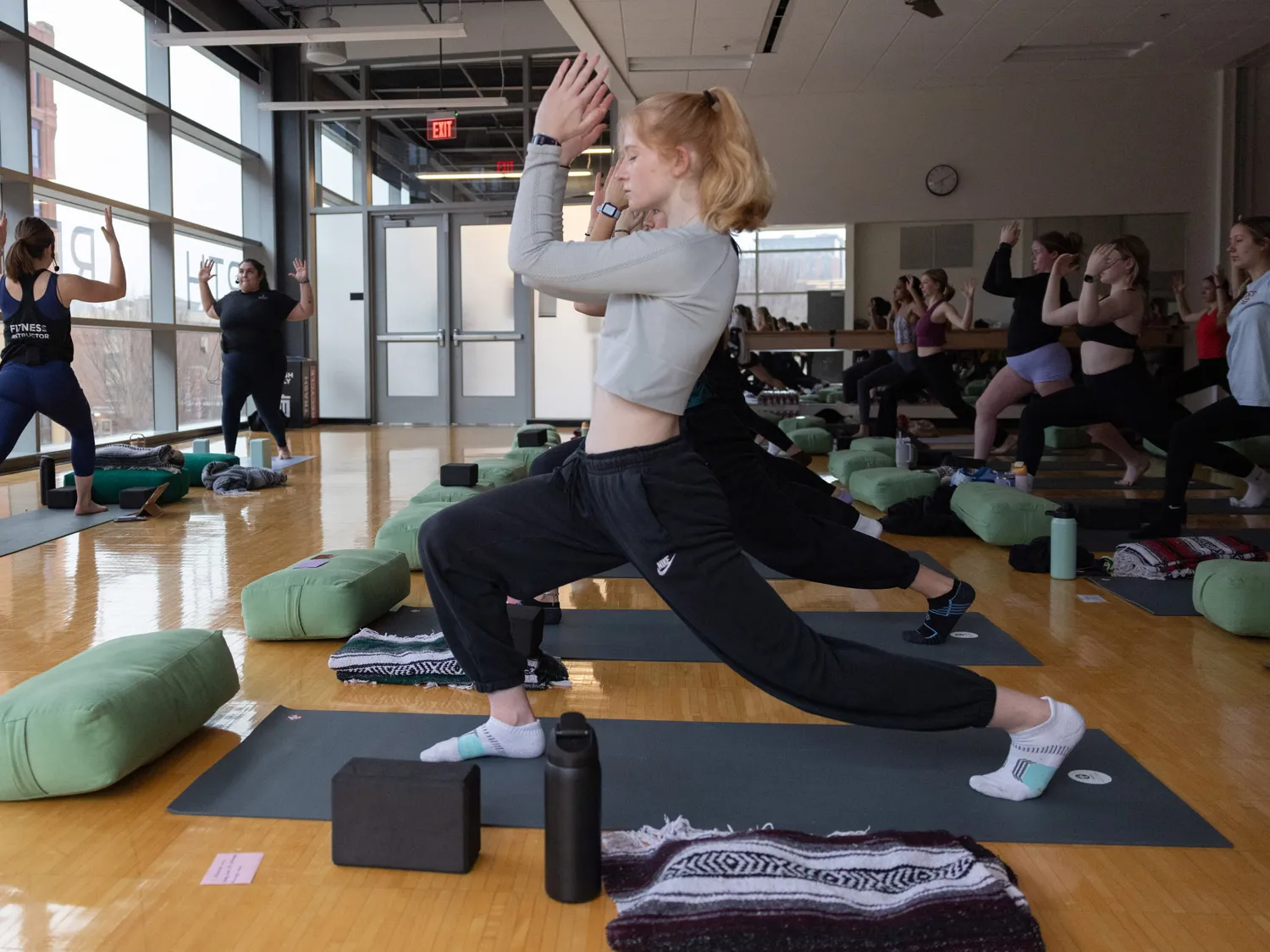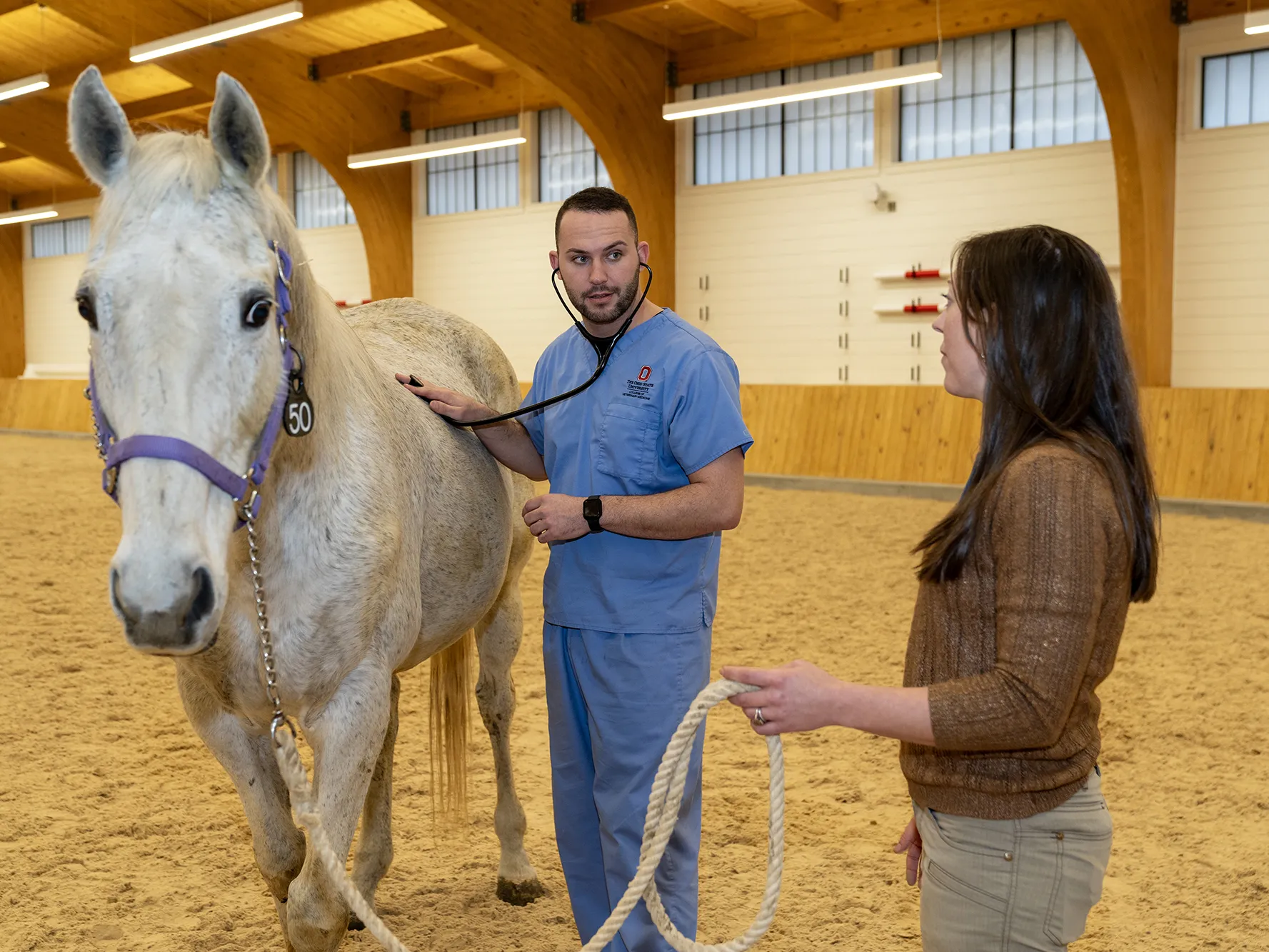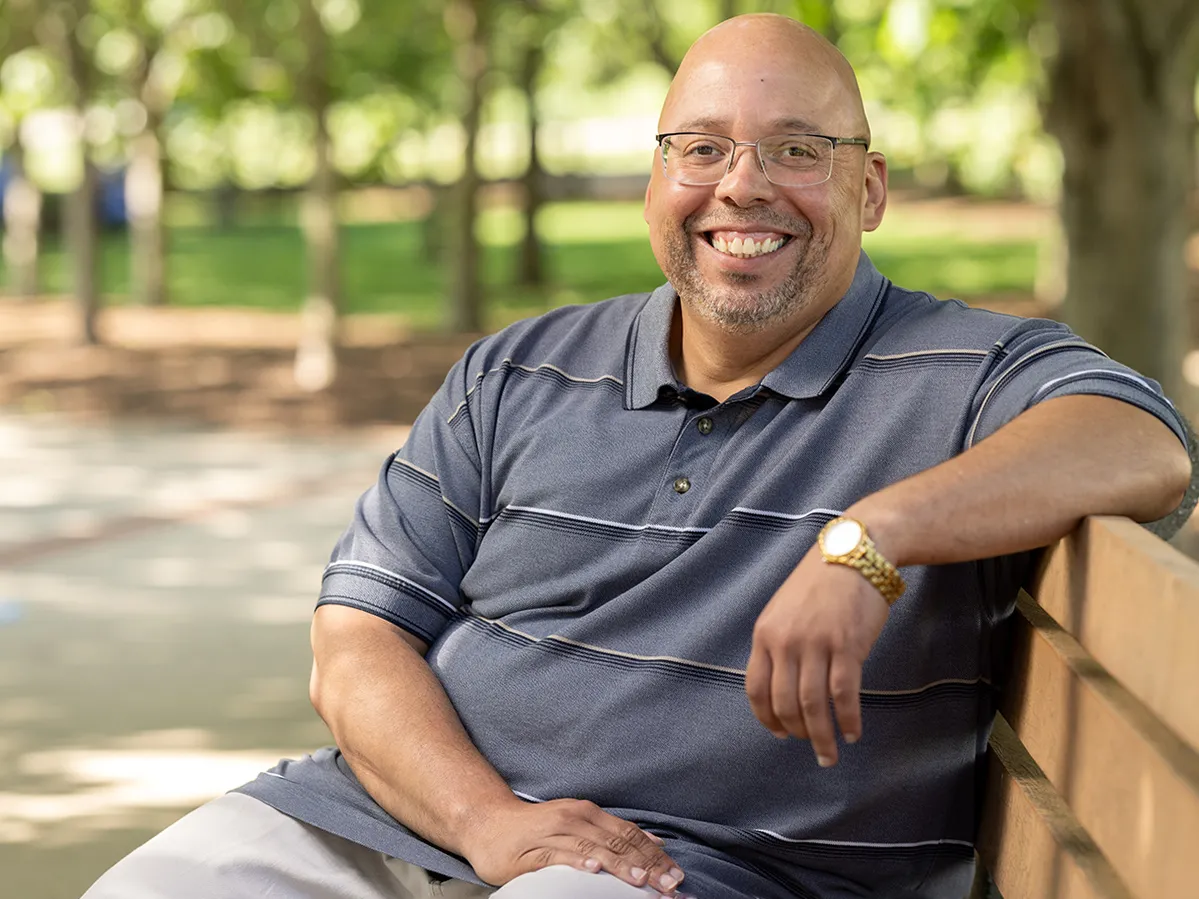From our home … and yours
We invited Ohio State students, faculty and staff to write letters to you about their lives and work experiences during this extraordinary semester. Here’s what they had to say.
Buckeyes and their loved ones have sent updates to and from campus for generations. They’ve taken the form of long, meticulously handwritten letters, short bursts of text, emails, care packages and more. The medium isn’t important. It’s what these messages mean — to senders and recipients — that matters most. In this collection of letters, written to you by Buckeyes across the university, we telegraph our resilience, our struggles, our determination, chronicling day-to-day life in a pandemic that we never imagined possible and sharing hopes straight from our hearts.
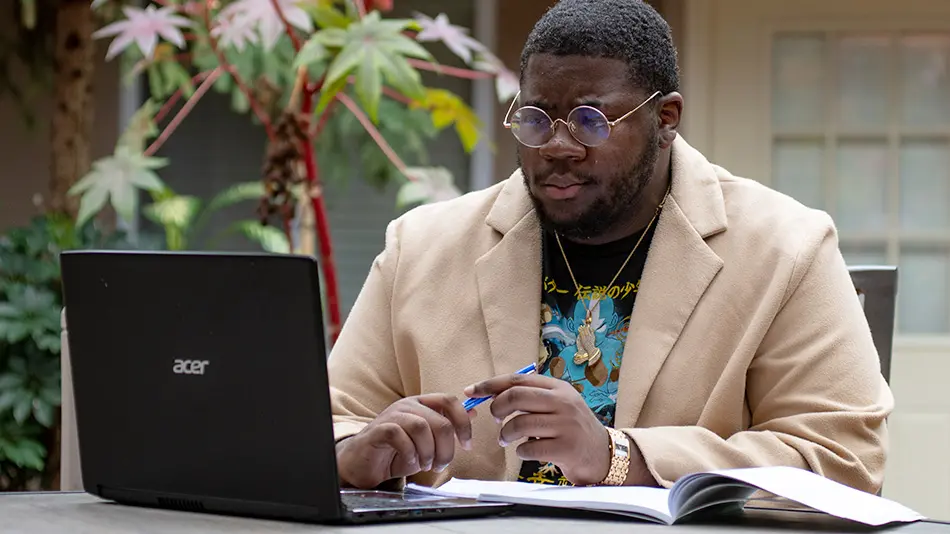
Online classes are among the things Kenshawn Simmons has had to adapt to during the pandemic.
‘I am an “in-person” person’
Kenshawn Simmons ’20, graduate student in the College of Social Work and peer access line volunteer
If you had told me I would finish my last semester as an undergraduate and begin my master’s work by attending virtual classes, I could not have imagined it. But as a College of Social Work student who had never before taken an online course, that is exactly my experience.
I am an “in-person” person — someone who thrives in the company of my professors and peers. That is how I learn best and establish genuine relationships. Transitioning to Zoom classes has been challenging — Zoom fatigue is real! — and it can be hard to stay engaged. I had to ask myself, “Why is this not working for you?” Ultimately, I came to understand I had to adapt to the new norm of this bizarre time.
My roommate moved in with her boyfriend at the beginning of the pandemic, and I felt isolated living alone. I talked regularly with my mom and sisters, but you only get so much from a phone call. So I make sure to practice self-care. For me, that means talking encouragingly to myself in the mirror, taking good breaths and being in the moment. Doing these things helps me keep in mind that I am lucky, that other people could be going through more difficult things.
I volunteer for the Buckeye Peer Access Line (PAL), which gives students the opportunity to call and talk with others about their problems. This is my first semester in the role, and I plan to do it for the remaining three semesters of my graduate program. I expect to graduate in May 2022. I have not gotten a PAL call yet, but I feel it is coming. I know it is. It is a waiting game — waiting to be of service.
My message to others: We can’t let this pandemic negatively affect us. We can’t give up — because somebody out there needs us to do whatever we are meant to do with our lives. We need to continue to think positively, to lift each other up, to be grateful for what we have. I take it day by day.
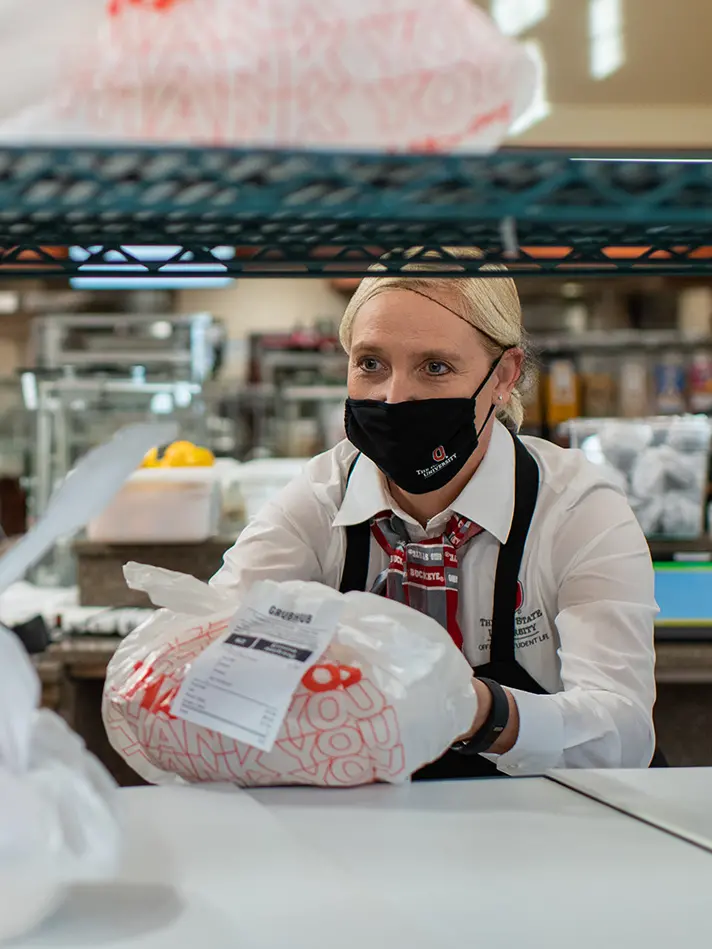
Abby Hertzfeld fills in at Kennedy Commons, packaging pre-ordered meals for students.
‘We are proud to serve our students’
Abby Hertzfeld ’97, ’04 MS, Student Life Dining Services’ associate director of operations
The pandemic has affected virtually every aspect of our students’ experiences at Ohio State — living in the residence halls, attending classes, socializing with friends and, closest to home for those of us in Student Life Dining Services, grabbing meals on campus.
I know I’m not alone in wanting the “old normal” back. In our efforts to keep our entire community safe and healthy, we needed to rethink so much of what we do. We worked together, following health mandates to provide a safe place for our students to get their meals and our team members to do their jobs. Our mission remains the same: Provide extraordinary food for students, prepare special meals for students with allergies and adjust menus in response to student requests. What has changed is how we do that.
Clear communication led to quick adjustments throughout fall semester, ensuring students and staff are comfortable. Students use a mobile app to order their meals and receive a notification when they’re ready for pickup. Far fewer students are able to eat together in dining facilities, where we’ve spaced tables
6 feet apart, so most dine elsewhere. Our staff has been great in adapting to the necessary changes, especially in light of a university hiring freeze. We are blessed to have such a solid team.
In my 23 years with Dining Services, I never thought I’d see a day when our staff would wear masks and face shields, when interaction with students was minimal or when we’d no longer offer a self-serve salad bar. What I miss most, though, is the buzz and energy of large groups of students gathering for meals in our dining facilities.
I can’t say enough about how kind and understanding the students have been! They are flexible and appreciative, and they really motivate us to be our best each day. It’s different — and challenging — but we are proud to serve our students as we stand together as Buckeyes.
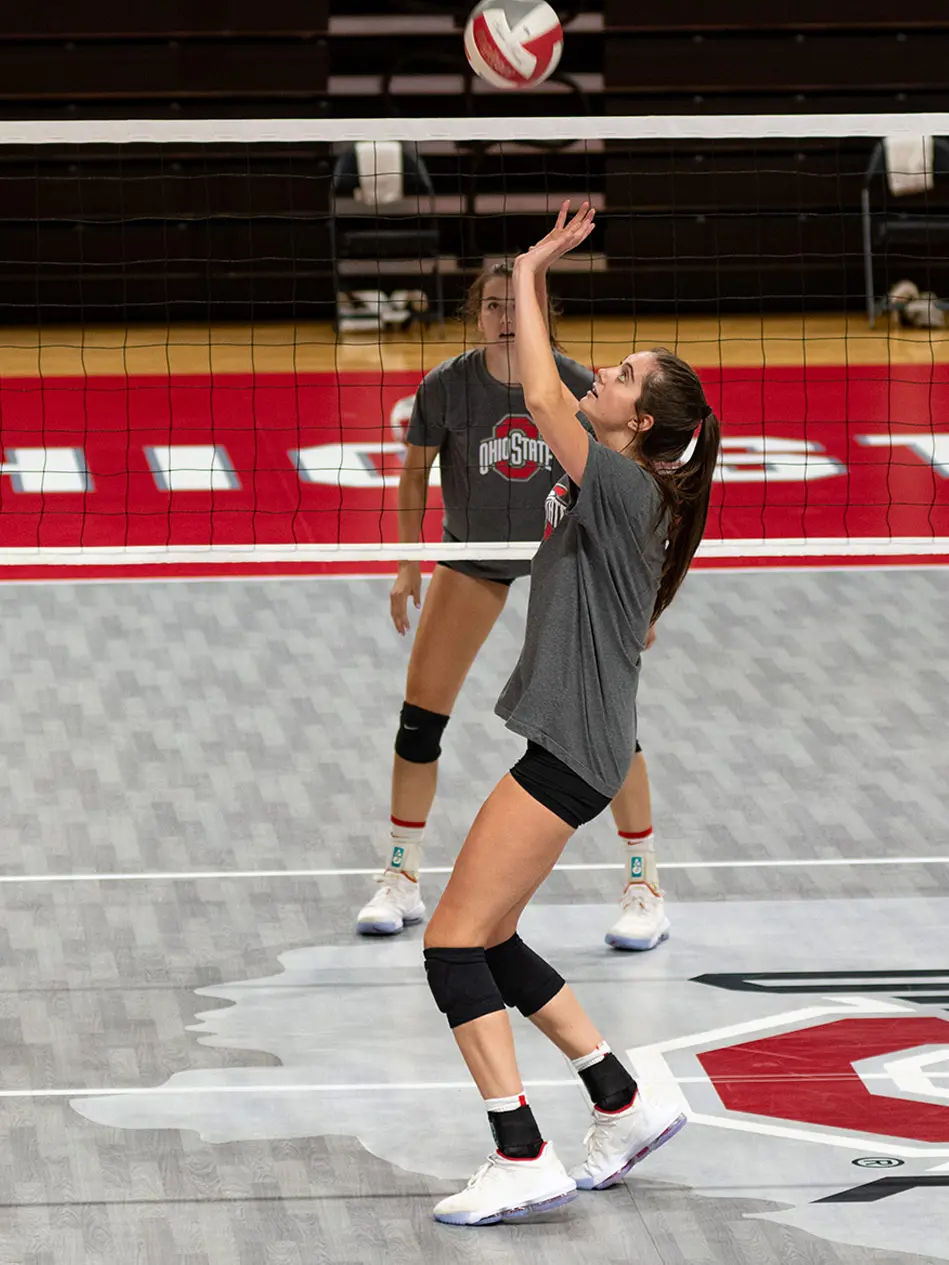
Volleyball player Lauren Witte practices with her teammates this fall in the new Covelli Center.
‘My teammates’ hard work held me accountable’
Lauren Witte, fourth-year health sciences major and middle blocker on the women’s volleyball team
What a year 2020 has been to be a student-athlete at Ohio State! My teammates and I have experienced countless highs and lows since being sent home in March. COVID-19 meant we couldn’t train in person for the rest of the school year, prompting worry and frustration. I wondered how I would prepare for my last season as a Buckeye.
However, our new coaching staff, led by former Buckeye player Jen Flynn Oldenburg, did an amazing job establishing a solid foundation before spring break. They showed just what they had been teaching us: resiliency. This inspired us to make the most of the situation.
Luckily, the NCAA lifted restrictions and allowed us to have virtual meetings with our coaches over the summer. Through daily Zoom meetings, we learned to keep our heads in the game without actually playing it. We created a team culture and core values to get us through this tough time, and our coaches developed a Flip the Switch program to help us focus on our mindsets while facing adversity during the pandemic and beyond.
Seeing my teammates’ hard work held me accountable to work out and practice any way I could — even by passing a volleyball against my childhood treehouse! I also was applying for physician assistant school, working the night shift full-time at my local hospital, taking summer classes and studying for the GRE. The hard work paid off, though: I have been accepted to five PA schools!
This fall, we were hit with news that our season would move to spring semester. We stayed positive and relied on the culture we had built to weather the change. Reminding each other to take it day by day has helped us focus on the now while keeping the big picture in mind.
We maintain our “bubble” within the team to make sure we can keep practicing — 10 feet apart — during all of this. I have five classes, one in person and four online; luckily, time-management and self-motivation skills I’ve developed as an athlete are helping me thrive. Needless to say, this isn’t how I expected my senior season to play out. It has been very tough, but I am so thankful to be at Ohio State while going through it.
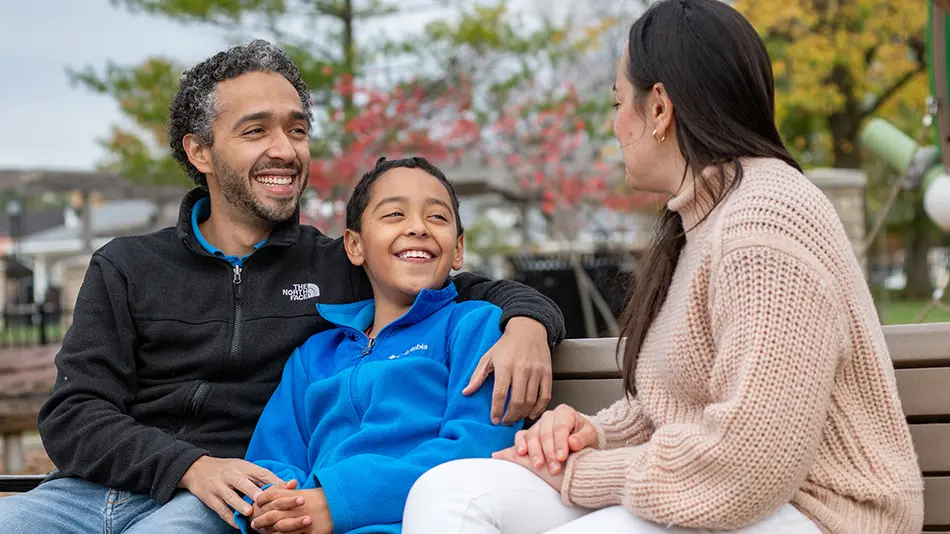
Jorge Ramirez Orrego frequently spends time with his son, Simon, and wife, Tatiana Cuellar, at Northam Park in Upper Arlington.
‘It has made us stronger as a family’
Jorge Ramirez Orrego, Fulbright scholar in electrical and computer engineering
The pandemic has meant big changes for my family — in Columbus and Colombia.
I am in the second year of my master’s studies, which focus on promoting renewable energy through optimization modeling for energy systems. My wife, Tatiana Cuellar, is a visiting scholar in the Department of Microbiology. We have a son, Simon, who is 8.
Ohio seasons have been hard for us, but at the same time, it is really nice to see how nature changes. At home in Medellin, Colombia, most days are in the 80s all year, so we do not have seasons. We were eagerly awaiting summer when the COVID-19 outbreak reached Columbus in March.
We began home schooling Simon, who missed his friends at school and not being able to play outside. We all miss the activities we did as a family, like visiting museums, going to the cinema or just dining out.
Spending day after day in our apartment, with Tatiana and I trying to balance our academic lives with instructing and entertaining Simon, has been hard. Every day seems the same. But, being here with my wife and my son — and all of us having the opportunity to get to know each other even better — has been wonderful. It has made us stronger as a family.
This is an amazing time to spend with our son before he grows into an adult. We are trying to make the most of teaching and guiding him.
We miss our families in Colombia. If we were at home, we would see them every weekend. Now, we are not able to go to our country because the borders could close at any time, and we might not be able to return to Ohio State to complete our work here.
I know that even though this may take some time, we will get through it, I’m pretty sure. We always have to make the most of any situation. The Buckeye community is very strong and cares a lot about students.
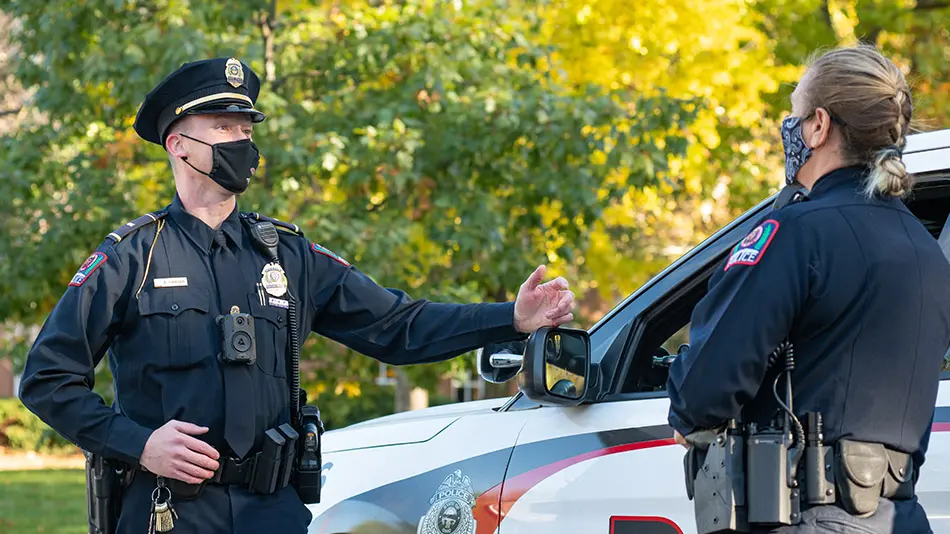
Lt. Brandon Yankanin, who oversees day watch officers in the university’s Police Division, talks with Officer Regina Shoopman during a recent shift.
‘All of us are being more cautious’
Brandon Yankanin ’02, day watch lieutenant with The Ohio State University Police Division
State classes went virtual and students moved out of residence halls in March, the Columbus campus was missing its usual hustle and bustle.
Even fall semester, with so many classes meeting only online, you don’t see much foot traffic, even at class change. Fall Saturdays are the most unusual. This was the first time in my 17 years as a campus police officer that I haven’t been on duty for home football games.
I feel bad that students’ college experiences are marred by the pandemic. They’re missing out on a lot. But everyone is coping as well as they can, and faculty, staff and students have been good about wearing their masks. All of us are being more cautious in order to limit the spread of the virus, including our officers, who don’t want to bring it home to our families.
I’m the day watch administrative lieutenant with our department, meaning I support and supervise the officers who work day shift. I’m also assistant commander for our special response team and supervisor of both our ordnance team and field training.
My association with the department began 20 years ago when I was hired for the student safety service. I also met my wife, Lauren Ward Yankanin ’04, who used to work in the university’s Department of Public Safety, on the job. We have two kids, Gavin, 13, and Abigail, 10, who transitioned to online learning in the spring and now have a mix of in-person and virtual instruction.
We were affected by COVID-19 firsthand when seven of our family members, including my daughter, contracted it while on a trip over the summer. Thankfully, everyone is OK.
For our family, the slower pace is a silver lining. Lauren and I are spending more time with the kids — and less time running them places. We are using it as an opportunity to focus on what’s most important.
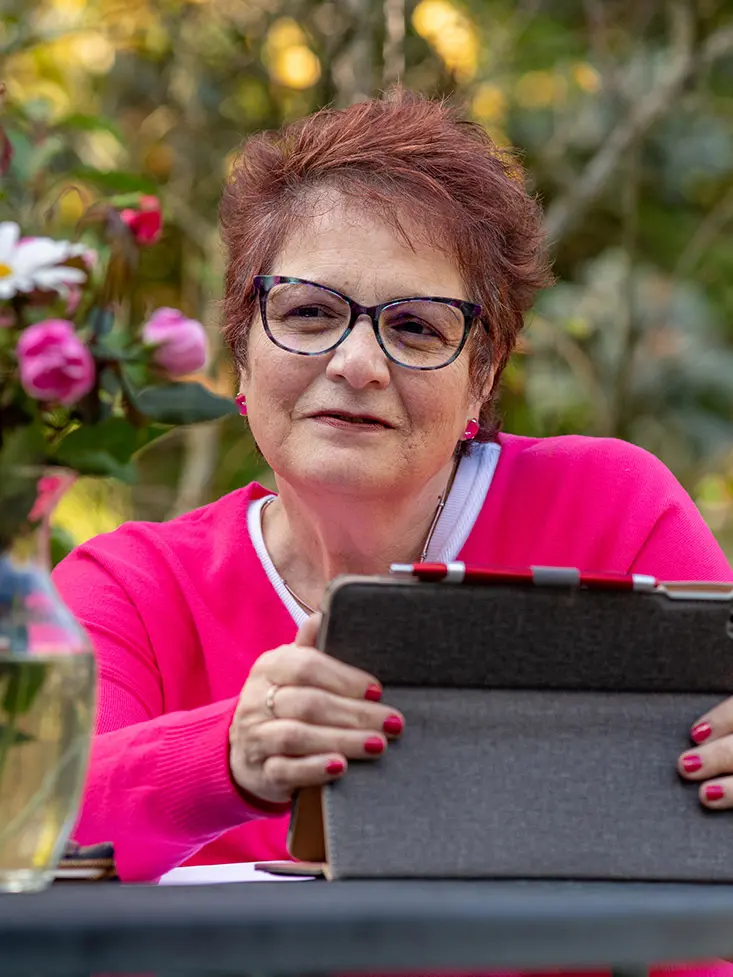
Electra Paskett’s primary research focus is cancer. But the pandemic has given her the chance to contribute to COVID-19 research.
‘My saving grace is my morning time’
Electra Paskett, the Marion N. Rowley Professor of Cancer Research and director of the Division of Cancer Prevention and Control in the College of Medicine
I’ve always approached big problems by dissecting them into little parts. The COVID-19 pandemic is no different.
In mid-March, we began converting all of our community-based cancer projects to remote formats. As it turned out, some then had to be put on hold. We’ve also redirected efforts toward COVID-19 research and education. I fully credit my senior staff members, who quickly learned to manage their community health researchers remotely.
Fortunately, we have a lot of experience working from a distance. One example is a 90-county grant project to assess the effectiveness of two different interventions to improve cancer screening for women in rural Indiana and Ohio. It started before the pandemic and is wrapping up.
Other projects we had to alter. We had just kicked off a study of cervical cancer prevention in the Appalachian regions of Ohio, Kentucky, Virginia and West Virginia and had to pause the whole thing because we didn’t want to press those health systems while they were dealing with COVID-19. We also had to postpone a study, funded by the American Cancer Society and Pelotonia, addressing the high rates of breast cancer in African American women in 12 counties in Ohio. Both projects are starting up again in remote formats.
Working from home allows more time for writing grants, reviewing papers and working on manuscripts. I usually sit for 10, sometimes 12, hours a day. My saving grace is my morning time doing weights and the elliptical.
That focused time allowed me to work with Dr. Rebecca Jackson and a team here at Ohio State and Nationwide Children’s Hospital to submit a $5 million grant for COVID-19 education, contact tracing and testing of underserved populations. The National Institutes of Health just funded the project, called RADx-UP, which also will address the social determinants of health, such as the difficulties of quarantining, paying bills and getting food.
The relevance of this work is not lost on me. As a three-time breast cancer survivor, there are very few places I go even with a mask. In August, my husband tested positive for the virus. We are fortunate to have a house where our family could all quarantine. Not everybody has that option.
It’s a very scary thing. We have to persevere so this research continues.
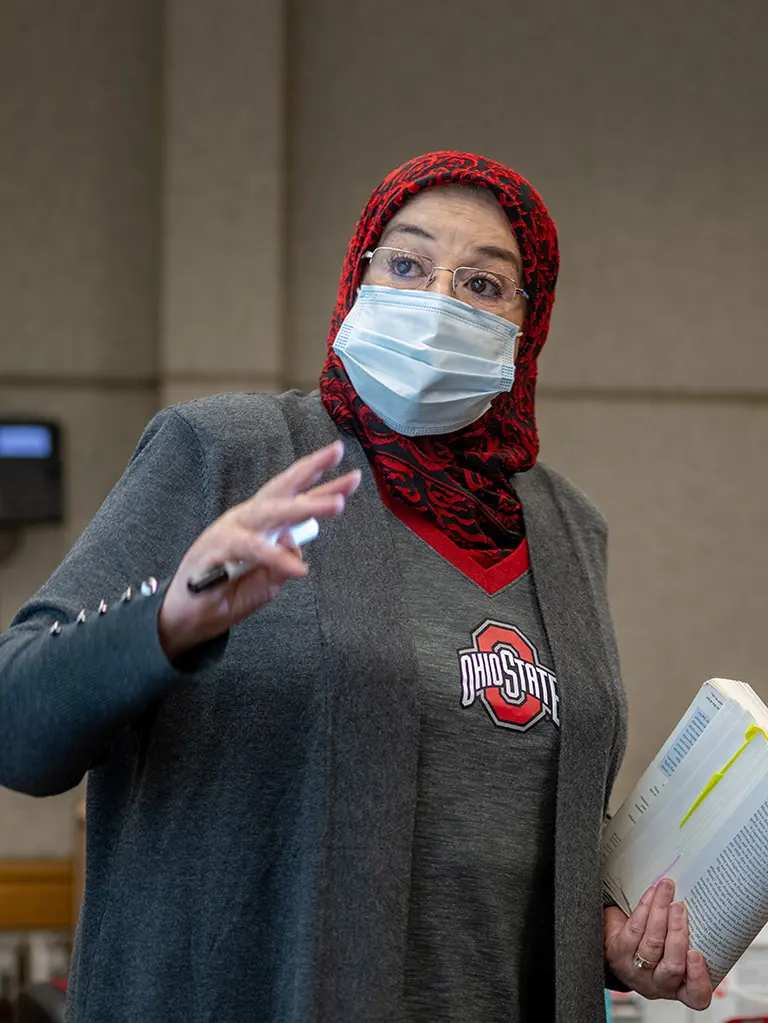
Rachida Labbas and her students at Ohio State Newark opted for in-person classes during fall semester.
‘Students were coming together’
Rachida Labbas, Department of English lecturer on the Newark campus
Spring 2020 was my first semester teaching at Ohio State Newark. So when the pandemic started, I was in the middle of adjusting to a new environment. The best semester in my life — because of my new position — also turned out to be the semester with the biggest challenge of my life. To overcome it, I had to do what I was asking of my students: Be resilient.
To be honest with you, it was not easy, and I was scared. Then I thought, I must stay focused, because both my family and my students need me. Two things I did during the summer were very helpful. I learned as much as I could about the virus and I took training Ohio State offered about teaching during the pandemic.
I had to decide whether I wanted to teach my fall classes in person or online. I opted for in person. I felt I was prepared to return to campus and, more importantly, I believed it would help me better connect with my students, understand how they felt and know how to best support them. I was right! My students and I have been enjoying our time together. One student told me, “This class is so real.” I have learned not only to tell students to be resilient, but to teach them how.
I opened a dialogue about the impact of the virus on our lives. I assured my students they were not alone, and that it is only through frank conversations that we can get through all the challenges that face us now. When students realized it was a safe environment for sharing, they opened up and talked about how they were doing. They discussed things they previously considered taboo. Sharing how the pandemic affected their social, economic, academic and personal lives created a very warm atmosphere. Students were coming together!
I told my students we had to find a bright side to this crisis so we could thrive in spite of the challenges. Coming together contributed to that bright side. As another student told me, “Now, I greet my classmates each time I come to class.” Our conversations also helped my students pick topics for the semester’s major paper.
I hope all of you thrive during this time of learning.
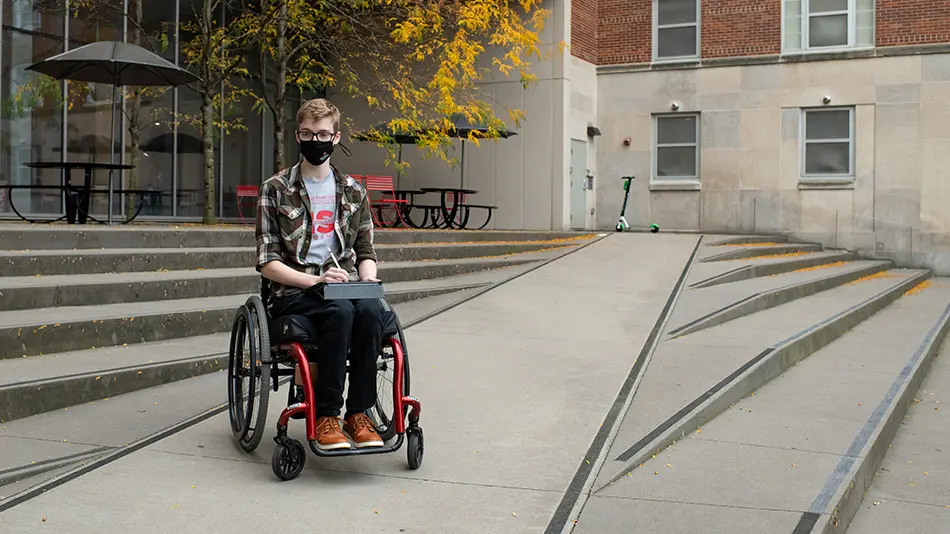
Kayden Gill and other students have been working on an accessibility audit of the Columbus campus this fall.
‘We’ve all had to find ways to adjust’
Kayden Gill, third-year health sciences major and co-president of Buckeyes for Accessibility
As you can imagine, life at Ohio State has been interesting lately. We’ve all had to find ways to adjust to living with COVID, which has created a support system built on giving — and somehow has brought us closer despite being physically forced apart.
Overall, the campus community has become more focused on understanding each other’s needs and working to accommodate them. As a student with a disability who relies on interdependence, this has been both a refreshing and frustrating thing to watch the rest of the world start to grasp.
The Disability community has been calling for needed flexibility and change for generations, only to be told time and time again that it wasn’t possible, that it asked too much of the world. Witnessing these impossible shifts unfold in just months when a different force necessitates it is bittersweet.
Nonetheless, members of Buckeyes for Accessibility (B4A) have been using this period of increased action to bring awareness to aspects of campus life in need of improvement. Currently, we’re planning a Columbus campus accessibility audit to identify areas of concern and highlight other areas that can serve as models.
We want to bring Buckeyes a clearer picture of how to navigate a retrofitted campus, one not designed with access needs in mind. We are starting where the Americans with Disabilities Act left off, because — as many of us know firsthand — a compliant campus does not equate to a fully accessible one.
Personally, I’ve had to find new ways to implement my plans. This year was supposed to be spent taking part in the College of Medicine’s ASPIRE Medical Research Program. As a Morrill Scholar and member of B4A, The Bioethics Society and Trans*Mission, social justice and change are at the core of what drives me. I was excited to have the opportunity to be involved in progress within the medical field while engaging in conversations about health care inequalities and representation.
When COVID hit, undergraduate research came to a halt, but those conversations became even more important. ASPIRE leaders matched me with an amazing mentor who has helped me adapt my plans and find a newly developing lab where I can be more directly involved in change.
Things might be different, but the world is still turning.
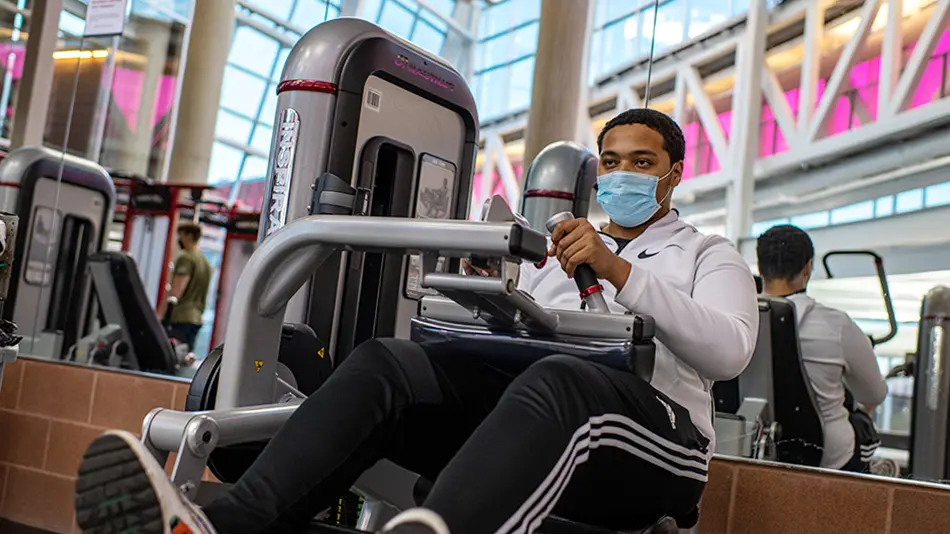
Ronnie Tate, a first-year student at Ohio State, works out at the RPAC, one of his frequent stops with friends during his unexpectedly extraordinary first semester of college.
‘Next year, I hope … college will be more like I expected’
Ronnie Tate, first-year student in the Young Scholars Program
I was a junior at Taft Information Technology High School in Cincinnati when I decided to attend Ohio State. My anatomy and physiology teacher told me about the university’s Young Scholars Program, for students from the state’s biggest urban school districts, my sophomore year. She recommended I check it out, so I did. Spending time on campus while I was in high school led me to choose Ohio State.
But I didn’t think my first semester would be like this. How could I? I think spring will be pretty much the same, but I hope COVID is under control by my second year.
To be honest, starting here with all this going on is kind of disappointing. When I scheduled my fall classes in July, I thought about half of them would be in person, but they’re all online. I’m taking Psychology 1100, Math 1075, 20th Century Fashion History and a Young Scholars class. I’m also in University Exploration while I consider a major. At this point, I’m interested in international business and computer science or computer engineering.
I don’t know what campus life will be like without a pandemic in progress. Most of my friends are in Young Scholars, too. Besides activities on Zoom, we sometimes walk down High Street, and we go to RPAC quite a bit. I’ve never seen a gym like that with so many things you can do. I usually run on the treadmill and do free weights or machines.
Ohio State is a cool environment. I love the campus. It’s beautiful — Mirror Lake, Ohio Stadium, places like that. You can meet a lot of people. I didn’t really think there were going to be this many people and so many different ethnicities, people from all over the world.
I went home on weekends a lot this fall, but next semester I’m going to try to stay on campus more. Next year, I hope I can go to football games, attend classes in person — I think I learn better that way — and that college will be more like I expected.
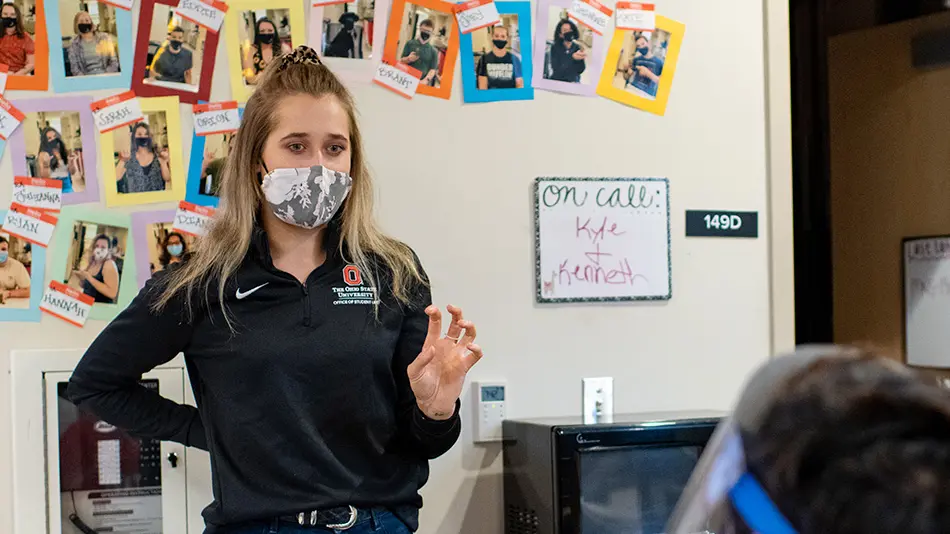
Haley Quinlan talks with office assistant A.J. Schumacher behind the front desk at Scott House.
‘Buckeyes relying on Buckeyes’
Haley Quinlan, fifth-year majoring in psychology and Mendoza/Norton/Scott Complex resident manager
Being part of the Ohio State community for the past four years has helped me find my passion and a greater purpose for my future.
I transferred here between my first and second years of college and instantly fell in love with on-campus life and the welcoming Residence Life staff. I soon took a job as an office assistant in Scott House, where I lived that year and was a resident advisor the next. I’ve been resident manager of the complex both this year and last, meaning I oversee the front desk staffs of each house and handle room assignments and administrative work.
Ours is an incredibly dynamic community, and in it I’ve formed the most genuine relationships with my fellow Residence Life staffers. This year, I’m applying to grad school to study higher education and student affairs, and I’ve come to realize what I truly value in my work: the opportunity to foster belonging through community.
In past years, I’ve been able to connect with other students simply by leaving my personal living space. Because of measures necessary to protect the well-being of our university community, that’s not the case now.
It can be challenging to live in a community that’s familiar yet also so different. But I do find it fulfilling that as paraprofessionals, we’ve accepted the challenge. We’ve had to be much more intentional to establish elements of community through safe, socially distanced platforms. For example, since we can’t just walk through the complex and socialize, I’ve created a picture wall near the front desk so residents can get acquainted with staff members within our complex. RAs also offer programing online — and often they just jot words of support on Post-Its that they leave on residents’ doors.
The COVID-19 era also has meant adapting to new ways of feeling a sense of accomplishment. I’ve always felt most productive when I go somewhere — to class, to the library, to an office. My room was my sanctuary. Now, with my classes online and recorded lectures accessible on demand, I’m in my room so much more. Accomplishments look different now, and that’s OK.
Throughout these times, I’ve found a real connection with my supervisors, Jon Onnen and Chris Jayaprasanna, who have supported me unconditionally. It’s also been incredibly helpful to confide in my co-workers and other paraprofessionals on campus. Whether it be over Zoom or through small, socially distanced gatherings, we’ve benefited from these opportunities to connect with one another.
It would be impossible to be entirely prepared for a situation like this. Fortunately, Residence Life has made sure we’re properly supported — because Buckeyes relying on Buckeyes is more important than ever.
Tracy DeCroce and Mary Alice Casey provided writing support for some letters.
